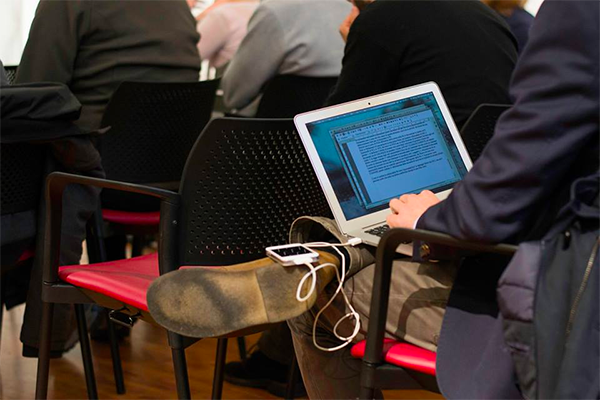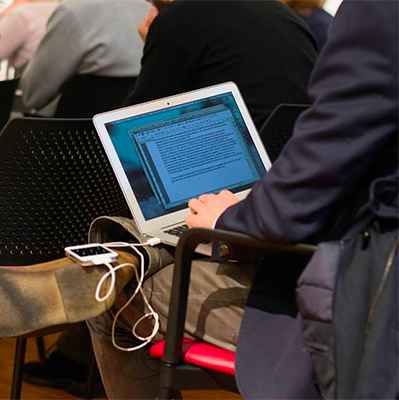
For the first time in Italy, open data is high on the political agenda. Momentum is building at all levels to make more information available to citizens. So can open data help detect and prevent corruption? A panel of journalists, activists, researchers and government representatives tried answering that question during the first panel discussion of the 4th International Journalism Festival in Perugia, Italy.
The panel was chaired by Lorenzo Segato, director of RiSSC, a non-profit research center focusing on security and crime. RiSSC is currently leading an EU-funded research project called TACOD (“Trasparenza, Anti Corruzione, Open Data”) to promote open data as a tool to prevent and detect corruption.
For Guido Romeo, journalist at Wired Italy and co-founder of Diritto di Sapere, it’s not because data exist and can be accessed that the status quo has changed. At the end of 2013, Wired Italy published “Soldi ai Partiti”, an online database tracking more than 5 billion EUR of donations and public funds given to Italian political parties since 1992. The information came from the written declarations provided by Italian parliamentarians. “We had to transfer thousands of PDFs to a database which could be read by computers,” said Guido Romeo. “This is why we need data in formats which we can read and process.” He said one needs to know what data to look for. “Open data can help with transparency but it cannot always help fight corruption”, he said.
According to Francesco Tortorelli from the Agency for a Digital Italy (AGID), the current do-nothing attitude in public administrations makes opening data difficult. “This attitude creates opacity, which in turn facilitates corruption. The government and citizens need to work together for more transparency.”
Quality data means metadata
“Fighting corruption is not just about finding open data. It’s also about fighting the general climate that makes corruption possible”, said Giuliano Palagi, director general of the province of Pisa and member of the permanent consulting group of Avviso Pubblico, an association of cities, provinces and regions dedicated to fighting corruption and unlawfulness. “We have to ask public officials at the highest political levels for openness to make sure we have access to all kinds of data.” But, he said, data need to be understandable. “We have to help our public administrators to make this cultural shift: they need to produce data not for the sake of data, but they need to think about why they produce data.”
“If we want to provide open data, we have to organize our public administrations around that,” said Stefano Pizzicannella, an expert in public administration and the Italian point of contact in the Open Government Partnership (OGP). Stefano Pizzicannella said spending by public officials and tendering processes should be made available to citizens. “The civil society should be able to see how funds meant to finance public services are spent,” he said.
“To do so, we need to reach for five-star data,” said Fabrizio Di Mascio, public officer from ANAC, Italy’s anti-corruption authority, referring to a term coined by the creator of the world wide web Tim Berners-Lee. “Accessing open data is not enough, we need to know where the data come from to know where corruption comes from.” The information about how the data are made, called metadata, should also be accessible.
Benedetto Ponti, researcher at the University of Perugia, agrees: “The open data concept on its own can’t fight corruption,” he said. “To detect corruption, we need to be able to rebuild the processes that have led to corruption and make links between datasets. This is at the heart of the open data logic. We also need more standardisation of the data, to help make those links more easily.”
A strong role for citizens
Fabrizio Di Mascio criticized the November 2012 anti-corruption law (called “law 190”), saying no public administration today abides by these rules. “We need a strong message from the civil society calling for more open data”, he said.
But the capacity to ask for and analyse data is still lacking in the general public. “Sometimes we say our administrations are transparent because they have published data online. But that doesn’t mean that our citizens can actually understand the information, ” said Leonardo Ferrante, from the civil society organisation Gruppo Abele. “We need to offer transparent services that really serve the citizens, in their own language, and that are understandable.”
“There are still a lot of issues in Italy as regards access to information,” said Cecilia Anesi, journalist and co-founder of the investigative reporting platform IRPI. She said it’s been difficult to access public spending data in the sectors of agriculture and cooperation to development. “Asking for these data is like waiting for a miracle,” she said. She called on the government to really start digitalizing its archives and provide a central data repository to the public. She later added that the transparency of the Italian company register and the procedures to access information could be much improved.
Guido Romeo said tools like applications can help citizens both access information and spread the word around them. “I’m a geek journalist, so I know what to do with the data and where the stories are. But citizens don’t see the data as we do. This is why we need to provide something they can look at on their phone and interpret to others around them. This is not necessarily going to create change but it’s going to help it.”
Several panellists called for an Italian Freedom of Information Act (FOIA), a law that allows citizens to ask government officials to make specific documents public.
The limits of openness
But, how much does transparency cost?
“In this debate about open data we always speak about costs but opacity is also a source of costs,” said Andrea Menapace, co-founder of Diritto Di Sapere. Benedetto Ponti agreed: “It’s been amply proven that when you open data, you reduce excess spending.”
Davide Del Monte from civil society organisation Transparency International Italy said public administrations can already make an effort to better communicate.
Leonardo Ferrante said that communication should focus more on the impacts of corruption in Italy. “Corruption leads to other issues such as lack of safety at work, unemployment, the difficulty for small companies to grow and prosper, etc. Often the data we need to better communicate already exists, we just need to make them more easily available.”
Andrea Menapace said that the main obstacle to openness is the human nature. “Open data is not solely about technology. Technology you can fix. But what we need is a real cultural change, a paradigm shift in our political priorities. We’ll see a real change when open data and open government won’t be a competence of the Ministry of Innovation but of the Ministry of Finance and other ministries producing data daily on all kinds of issues. We should aim at building an ecosystem where the sense of responsibility is shared amongst various people who can act at their own level to promote transparency.”
Delphine Reuter


